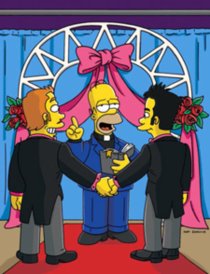 Walter Cronkite, for decades the embodiment of TV news, died Friday night in New York, his family said. The avuncular anchor once dubbed "the most trusted man in America" was 92 and had been in failing health.
Walter Cronkite, for decades the embodiment of TV news, died Friday night in New York, his family said. The avuncular anchor once dubbed "the most trusted man in America" was 92 and had been in failing health.“My father Walter Cronkite died,” his son Chip said Friday night. CBS interrupted programming to show an obit of the legendary anchorman.
Missouri born and Texas raised, the robust young Cronkite dropped out of college in 1935 to cover news and sports for various newspapers around the heartland, and, in 1936, met his future wife, Betsy, while working at the Oklahoma City radio station WKY. World War II found him actively serving as a correspondent for United Press International – landing ashore on D-Day, parachuting with the l0lst Airborne, flying a bombing mission over Germany, covering the Nuremburg trials and opening UPI's first post-war Moscow bureau.
Joining CBS in 1950 – initially at the network's Washington affiliate before he went national – Cronkite became a familiar figure on what was then considered "the Tiffany network," hosting a number of CBS programs, including the historical You Are There and the more serious Twentieth Century. His career turning point came in 1952, as the anchor of CBS's coverage of the presidential conventions.
Anchor Man Supreme
The professional role for which Cronkite will be forever etched in the collective public's memory was as the warm and wise anchor of the CBS Evening News, starting in April 1962. Nineteen months later, on Friday, Nov. 22, 1963, during a news bulletin that interrupted regular daytime programming, Cronkite held back his emotions as best he could and announced to the country that an assassin's bullet had taken the life of President John F. Kennedy – then removed his eyeglasses and wiped away an unavoidable tear.
That moment and Cronkite's coverage of the 1969 moon walk by NASA astronaut Neil Armstrong are iconic moments in American television, and yet there were so many more. When, in 1968, Cronkite said on-air that the Vietnam War could not be won, public opinion so dramatically shifted against U.S. involvement in the conflict that President Lyndon Johnson withdrew from running for re-election. "If I've lost Cronkite," LBJ was quoted as saying, "I've lost America."
In a widely covered news event of his own, Cronkite retired from Evening News on March 6, 1981, delivering for one final time his signature sign-off: "And that's the way it is." But that distinguished voice never strayed far, and in 2006 could be heard introducing the CBS Evening News With Katie Couric.
Loved to Sail
That moment and Cronkite's coverage of the 1969 moon walk by NASA astronaut Neil Armstrong are iconic moments in American television, and yet there were so many more. When, in 1968, Cronkite said on-air that the Vietnam War could not be won, public opinion so dramatically shifted against U.S. involvement in the conflict that President Lyndon Johnson withdrew from running for re-election. "If I've lost Cronkite," LBJ was quoted as saying, "I've lost America."
In a widely covered news event of his own, Cronkite retired from Evening News on March 6, 1981, delivering for one final time his signature sign-off: "And that's the way it is." But that distinguished voice never strayed far, and in 2006 could be heard introducing the CBS Evening News With Katie Couric.
Loved to Sail
In his personal life, he and Betsy Cronkite – actually, Mary Elizabeth Maxwell Cronkite – had three children: daughters Nancy and Kathy, son Walter III, and four grandsons. Betsy died in 2005. In addition to living in Manhattan, the Cronkites had a home on Martha's Vineyard, where, in his free time, Walter loved to sail.
Though it will be behind a desk, and not a mast, that Walter Cronkite will be remembered. As he said on his last Evening News broadcast, before turning his desk over to Dan Rather, "Old anchormen, you see, don't fade away – they just keep coming back for more."
Though it will be behind a desk, and not a mast, that Walter Cronkite will be remembered. As he said on his last Evening News broadcast, before turning his desk over to Dan Rather, "Old anchormen, you see, don't fade away – they just keep coming back for more."












No comments:
Post a Comment